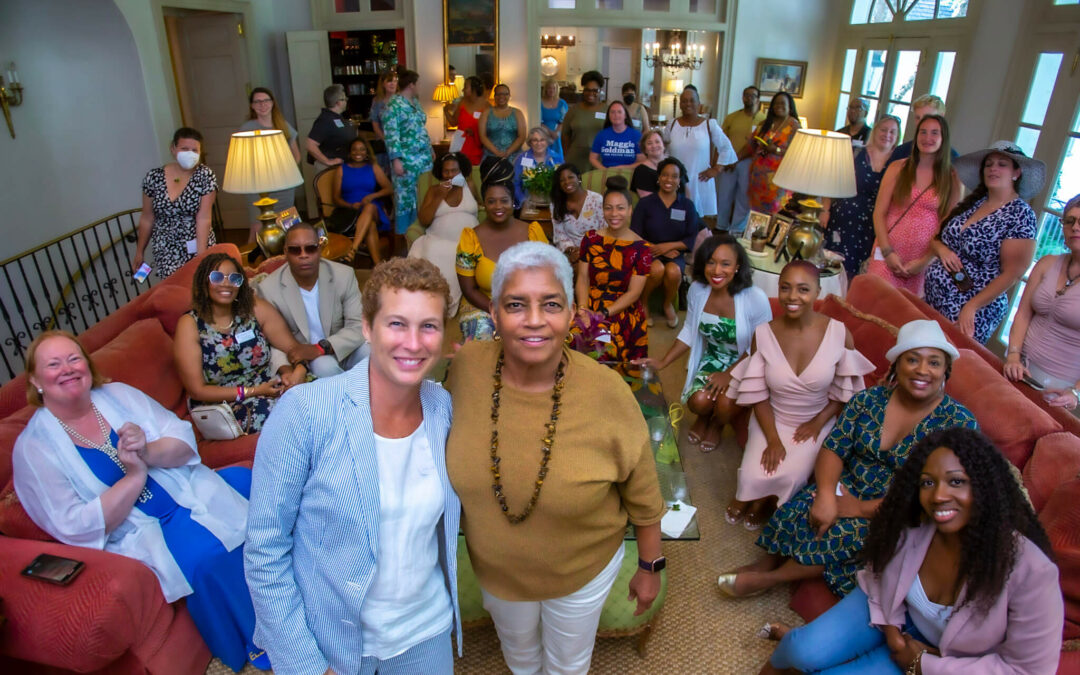Photo Credit: Erik Voss
Former Atlanta Mayor Shirley spoke to recent graduates of the WIN Leadership Academy program on Sunday afternoon June 12 during far-ranging remarks which both informed and inspired those attending the “COVID-delayed” graduation celebration at the home of WIN List Board member former Representative Elly Dobbs.
New WIN List Board Chair Wendi Clifton introduced Shirley Franklin as not only the first woman mayor of Atlanta, but also the first Black woman to lead a major Southern city – serving from 2002 to 2010. Mayor Franklin won office in her first campaign, though she had been involved in politics since her teenage years. Clifton outlined Mayor Franklin’s many accomplishments and awards, including being named a Georgia Trustee earlier this year, the highest honor accorded any Georgia citizen by the Georgia Historical Society.
Twenty or thirty years ago, Mayor Franklin said she and others near her age might never have predicted we would now find ourselves “fighting some of these same battles” after years of advocacy. We could never have predicted access to voting would be rolled back or Americans would be debating immigration, she said
“If you have studied American history, there’s no other way to describe it – there were immigrants and slaves. It’s not like we let the Indians participate in American democracy!” she said.
Making note of her remarks during the Georgia Trustee awards ceremony, Mayor Franklin said challenges to Democracy remain a great threat in Georgia and the world. “The challenges to democracy, that is why we need you in office, because it’s going to be hard work. There are a lot of people who don’t want to change and who want to close doors. It’s going to take a legion of folks – all of you and all your friends and relatives and everybody else you meet for the next 20 or 30 years to make sure the democracy is healthy and well, – not just in Georgia, but in the United States,” she said.
When Georgia voters made history on January 5, 2021 by electing two new Democratic Senators – Georgia’s first Black Senator, the Rev. Raphael Warnock, and Georgia’s first Jewish Senator, Jon Ossoff, Franklin said she was not surprised. “People have been working on it for a long time, a long time and we had great candidates, great candidates, just like you. Great campaign managers, great consultants, great supporters. It was a swell of support.”
“I would have expected Georgia to turn the Trump tide because Georgia has turned the tide before. There were plenty of great women in Alabama, in Tennessee and South Carolina, all over, you know, all over the south who could have been the first African American woman, mayor of a major city,” she said. “There’s some great cities throughout the south.”
“So why was it Georgia? Not because I’m so great because Georgia was willing to open the door to the possibility that a woman could lead. I’m real clear about that. I didn’t make the path that I walked down. The path was made by the sacrifices and gifts and talents of many, many people who came before me, including the women who were in the room, including the women in the room. Oh, I showed up and I worked hard. Don’t misunderstand me. That was my part to do, but I was walking down a path that had been opened for me by decades of people, really working hard.”
Mayor Franklin acknowledged women like Myrtle Davis, Emma Darnell and Grace Hamilton were pioneers on the Atlanta political scene and “were there long before me.” She said programs like WIN Leadership Academy are important because elevating women to higher office “doesn’t happen by chance.”
Mayor Franklin noted WIN List Board Member Dorothy Yates Kirkley, who attended the function, was an early supporter of her mayoral campaign and encouraged her to be a transformational leader for ethics reform. Mayor Franklin also discussed early support from corporate leaders and former Mayor Maynard Jackson, for whom she had been cultural affairs commissioner, and Ambassador Andrew Young, for whom she had been chief administrative officer when he served as Atlanta’s mayor.
She shared stories about being the first “blonde African American female mayor to the left of center” and how she forged alliances and partnerships on important issues with conservative corporate CEO’s. She said she was recruited to run for Mayor three years before the race and this is a signal how seriously people take politics in Atlanta and Georgia.
“You might run now,” she said. “You’re going to win if you run – I believe that. But, you might decide you don’t want to do it right away. The lessons are still the same. You have to prepare yourself. The (WIN) Academy helps you do that. You’ve got to prepare yourself mentally, emotionally, spiritually, and financially – because there is nothing worse than somebody in office who can’t pay their bills.”
“You know, if you’ve got champagne taste and beer money, you need to lower – lower your taste to meet what your abilities are. Because, there are a lot of dangers when you want things you can’t afford,” she cautioned. She noted many tempting offers are made to elected officials, but it is important to “be very discerning and careful about who you associate with and what you ask people to do for you.”
“Democracy is at stake,” she noted. “We are in court on voter suppression. Right now we are in a minority in many ways, in terms of our opinions and values. When it comes to women’s rights, we are in a minority it seems sometimes in the public debate. The public agrees with us, but a lot of elected people don’t. We are at a crossroads, I believe different from four years ago.
“I believe we’re at a crossroads culturally in the United States. We are being challenged culturally. And one of the reasons that we are seeing a lot of dysfunction is because America is changing. The values are being challenged.”
The founding fathers did not anticipate women being leaders in America, she noted. Over the years, women were advised to get educated, to be involved in the community and to rear their children. “Well, guess what? We’ve checked all the boxes and we not going anywhere. And, we vote! We vote, but we don’t vote enough. We can win every election that you are in if people vote in Georgia!”
She said while it is “fine” to seek out new voters. However, she cautioned the voters who regularly show up are “the best folks to look for.” She said, “We’ve got to look at women — Black and white, Latino and Asian. Women are the swing voters in this state.”
She cautioned candidates should not set perfection as their standard and said mistakes will happen. “The key to this is not to be perfect. I am far from that. The key is to continue to learn, not take it personally. Admit when you’ve made a mistake – learn from it. Pick yourself up and move on to the next challenge. The key is not to try to be perfect. The folks who try to be perfect, they kind of stand still. This tide is moving! So, we need you to be at the front of the tide and willing to take some risks. You are prepared to take risks by generations of women who have taken risks before you.”
Mayor Franklin said she went into her race for mayor believing “I could win if I never, ever gave up.” Based on advice from pollsters, she said she hoped to win without a runoff even though no Atlanta mayor since Hartsfield had won the office without a runoff. She won with a 181 vote margin. She said on election night, both she and her chief opponent were at the same large precinct. He was “huddled under a tree talking to his advisers,” while she personally greeted voters and asked for their support. “I think I met those 181 voters on the night of the election,” she said with a broad smile.
“You cannot win with just policy. You’ve got to win with politics – in the streets. Winning the election was just the beginning of my political career. You’ve got to win the race to make the decisions. You win the race!”
As mayor, she inherited a budget deficit and massive infrastructure problems which forced her to lay off employees, slash budgets and lobby for passage of a $3.5 billion bond program to repair crumbling sewers and water mains. She finished her eight years leaving behind a budget surplus. “My reputation is all based on the hard stuff,” she said.
Mayor Franklin cautioned WLA class members stand firm on matters of principle. Compromises are at times required, she noted, but remain true to your principles on issues you care deeply about.
“I am very careful about where I put my name and what I say I’m going to do… Who I’m going to be standing with. Whether I trust their word is good. I don’t have to agree with you, but are you authentic? Do I know you to be authentic? If you lie, if you steal. If you cut deals that are only self-serving, I’m not even going to be in a photograph with you. I see young people who get elected to the legislature and I see the pictures … and I’ve called legislators and said, sounds like a good program but I don’t understand why you were standing next to that person. And, they’re like. “Why?” I said, “Because photographs last longer! Be careful. I don’t want folks to think that I was okay with this stuff that they’re doing.”
There are times, she said, which call for frank discussions. “On those special occasions, when people say, say what is on your mind, you ought to say it. You ought to be proud enough of your opinions, your heritage, your history, and your future to take that five minutes. So folks will think about what you said. They will not forget,” she said.
Crediting Former Spelman President Dr. Johnnetta Cole as a mentor, Mayor Franklin said she often utilizes personal stories as well as stories from history or literature to communicate what she wishes to convey. “People remember stories, they don’t always remember everything else,” she said. Mayor Franklin also uses poems and even rap music.
“You have to find your own voice. We’ve had some brilliant women run nationally and even locally. And, they don’t ever find their voice. That’s one of the reasons they don’t win,” she said.
Asked about family considerations candidates face, she answered with trademark Franklin candor: “Number one, I told my family not to get married; not to get divorced; not to have children — not to do anything that was a choice. I’d be there for an emergency! But anything else you all gotta know upfront I am paying only minimal attention okay?
“Because I’m going to be consumed for this period of time with trying to meet new people and do new things. And, I want you to be well, but I’m telling you right now, I don’t have any extra time! So I was very direct with my family… you have to have an honest conversation. These things change when you were on the, in the limelight, in the spotlight.”

